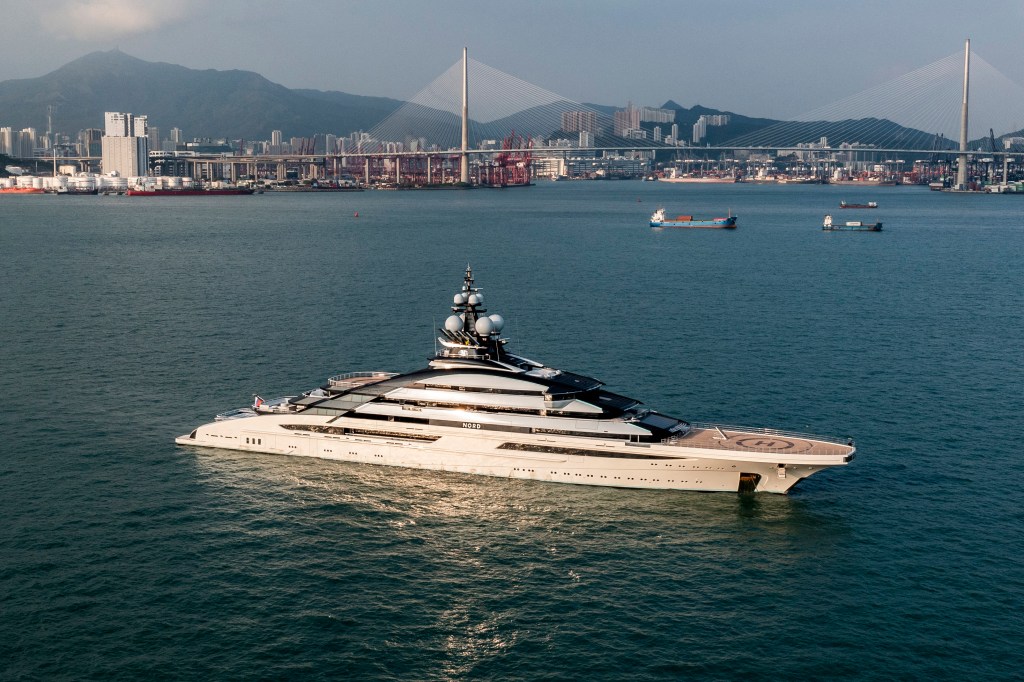Authorities on the hunt for Russia’s superyachts just got a new lead. The question is, can they get their hands on the vessel?
Nord, a 464-foot megayacht connected to the Russian oligarch Alexei Mordashov, turned up in Hong Kong on Wednesday after a weeklong voyage from the port of Vladivostok in southeastern Russia, where it had docked since March, according to the ship-tracking service Maritime Traffic.
Videos by VICE
Residents spotted the vessel anchored off the southwestern coast and posted images of the behemoth on social media. Its arrival in Hong Kong waters was approved by the city’s marine department and has been logged on its website.
With six decks, a swimming pool, a tender garage with a submarine, 20 suites, and not one, but two helipads, Nord is among the most luxurious yachts in the world and is estimated to be worth more than $500 million.
Its putative owner, Mordashov, is one of Russia’s richest men and an ally of President Vladimir Putin. Like many other Russian oligarchs, the 57-year-old steel mogul has been scrambling to keep hold of his assets after being hit by Western sanctions following Russia’s invasion of Ukraine.
As symbols of their power, the yachts have become obvious targets. The European Union, U.S. and UK governments have cast a global dragnet to seize Russian vessels in their waters.
Lady M, another superyacht that Mordashov is thought to own, is among over a dozen Russian-owned superyachts that have been impounded by U.S. and European authorities since February.
But getting this one won’t be so easy.
“China—and with it, Hong Kong—may be seen as one of the remaining ‘safe havens’ for Russians to avoid the sanctions imposed by a number of countries around the world,” Ian Ralby, CEO of I.R. Consilium, a global consultancy on maritime and resource security, told VICE World News, citing the “no limits” strategic partnership China and Russia declared in early February.
A special administrative region under Chinese rule, Hong Kong has closely aligned itself with Beijing as China’s tightening grip has eroded its semi-autonomy.
The Hong Kong government—whose top officials are themselves sanctioned by the U.S. over their role in the crackdown on democratic processes in the city—reiterated on Sunday that it does not implement “unilateral sanctions imposed by other jurisdictions.”
The U.S. warned last week that Hong Kong’s reputation as a financial center depends on adherence to international laws and standards, and could suffer as a result of ignoring the sanctions. “The possible use of Hong Kong as a safe haven by individuals evading sanctions from multiple jurisdictions further calls into question the transparency of the business environment,” a U.S. state department spokesperson told VICE World News.
Under Hong Kong’s law, a visiting yacht can stay for only up to 182 days, unless it is licensed with local authorities. But even if its stay is temporary, the city is among very few harbors where Russian yachts are still welcome.
Amadea, a $325 million superyacht linked to Russian billionaire Suleiman Kerimov, moored in Fiji in April, only to be detained by Fiji authorities. The Fiji High Court gave the U.S. the green light to seize the vessel, which was brought to San Diego in June, marking a win for Washington. Axioma, previously owned by Russian steel magnate Dmitry Pumpyansky, was seized by Gibraltar and auctioned off last month for an undisclosed price.
“It will be interesting to see where else they head at this point, but the world is getting quite small and unforgiving for them,” Ralby said. In an attempt to evade sanctions, some superyachts have stopped broadcasting their locations, while others changed their country of registration. Nord reflagged from the Cayman Islands, a British overseas territory, to Russia.
That said, Russia’s economic ties to certain countries make it hard for them to explicitly turn their back on Moscow—and their gleaming vessels. Maldives, for instance, was among 141 states that voted in March for a United Nations resolution to denounce Russia’s invasion of Ukraine. But the Indian Ocean island nation has allowed Russian-linked yachts to cruise around its atolls, as its economy relies on income from tourists, particularly Russian visitors with deep pockets.
“As interests and needs shift, some safe havens may open up as an exchange for getting other goods,” Ralby added.






